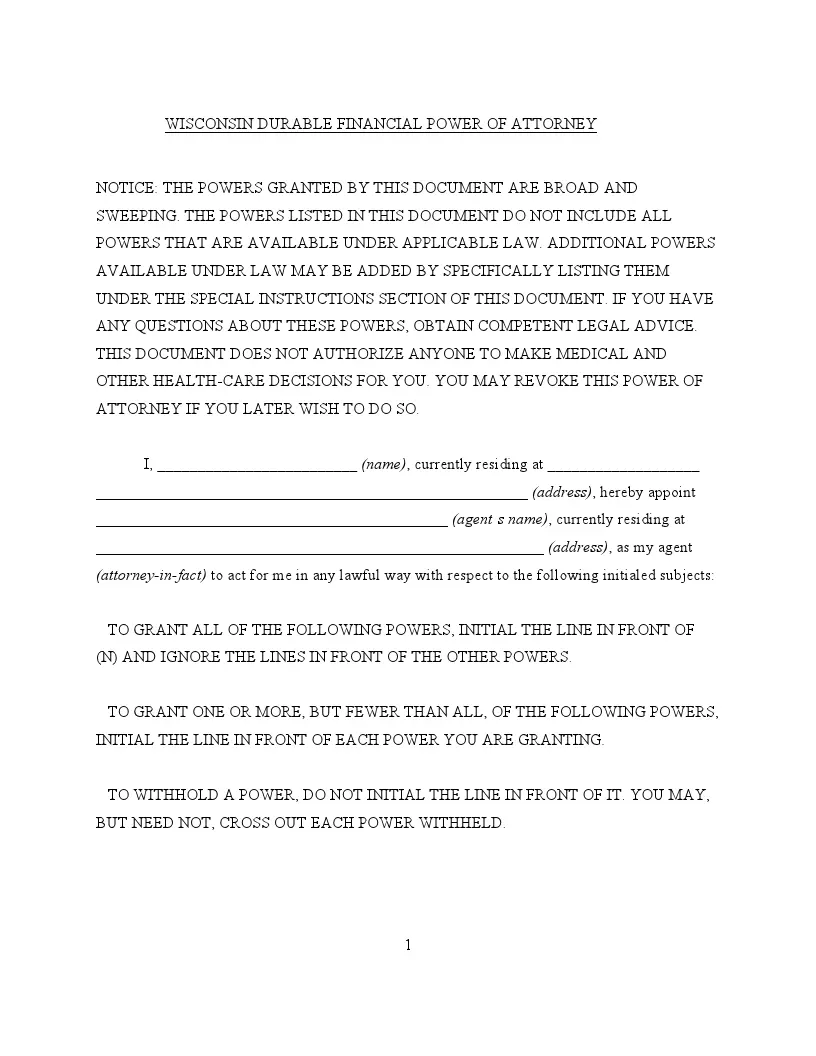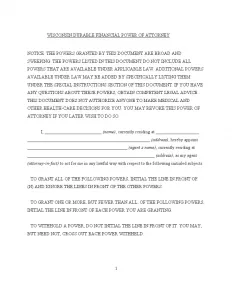Free Wisconsin Durable Power of Attorney Form
The Wisconsin durable power of attorney enables you to designate someone as your agent, granting them the authority to handle your financial and property matters. This form is valuable in cases where you may be unable to manage them for various reasons, such as health issues. Unless stated otherwise, this arrangement becomes effective immediately upon signing the document, and importantly, it remains effective even if the principal (person granting powers) becomes incapacitated.
The principal can assign expansive or specific powers to their agent in durable POA form. Such powers encompass overseeing bank accounts, settling bills, engaging in real estate transactions, managing investments, completing tax returns, and addressing various other financial responsibilities.
The principal should choose a trusted individual as their agent, who will have significant control over the principal’s financial resources. Choosing a spouse, adult child, relative, or close friend is common, but the principal can select anyone they trust. It’s also recommended to check up-to-date Wisconsin POA forms to ensure all legal requirements are met when drafting a durable power of attorney.

Build Your Document
Answer a few simple questions to make your document in minutes
Save and Print
Save progress and finish on any device, download and print anytime
Sign and Use
Your valid, lawyer-approved document is ready
Wisconsin Signing Requirements and Laws
In Wisconsin, the execution of a durable power of attorney for finances and property is governed by specific legal requirements outlined under section 244.05 of the state statutes. To legally execute such a document, the principal must sign a power of attorney themselves or have someone else, who is at least 18 years old and acting under the principal’s direct supervision and presence, sign on their behalf.
The signature of the principal, or the individual signing on the principal’s behalf, is presumed genuine if acknowledged before a notarial officer. Additionally, the signature’s legitimacy can be established through a witnessing process involving two witnesses. These witnesses must participate in a two-way, real-time audiovisual communication supervised by an attorney licensed in Wisconsin. This attorney can act as one of the witnesses. Key aspects of the remote signing process include:
- Confirmation of the principal’s and witnesses’ location within the state.
- Disclosure of any other individuals present in the room.
- A full display and verbal affirmation of the document by the principal.
- Signatures from each witness and the supervising attorney to validate their acknowledgment of the execution.
Under Wisconsin Statutes, specifically section 244.10, a power of attorney terminates upon various conditions such as the death or incapacity of the principal, revocation by the principal, completion of its purpose, or death or resignation of the agent, unless provisions state otherwise. The Wisconsin statutory form of power of attorney for finances and property is detailed in Wisconsin Statutes Section 244.61.
Wisconsin Durable Power of Attorney Form Details
| Document Name | Wisconsin Durable Power of Attorney Form |
| Other Names | Wisconsin Financial Durable Power of Attorney, WI DPOA |
| Relevant Laws | Wisconsin Statutes and Annotations, Section 244.05 |
| Signing Requirements | Notary Public and Two Witnesses |
| Avg. Time to Fill Out | 10 minutes |
| # of Fillable Fields | 37 |
| Available Formats | Adobe PDF |
Popular Local Durable POA Forms
Durable POA documents are used in each and every state. Take a look at other popular DPOA forms frequently filled out by Americans.
Steps to Complete the Form
Filling out the Wisconsin durable power of attorney for finances and property requires careful attention to detail and understanding its implications.
1. Identifying the Agent
The first step involves identifying who you will appoint as your agent. Fill in the name, address, and telephone number of the person you trust to manage your financial affairs.
2. Designation of Successor Agent(s)
It’s wise to appoint a successor agent if your primary agent is unable or unwilling to perform their duties. Provide the name, address, and telephone number of the successor agent. You may also appoint a second successor agent using the same process.
3. Granting Authority
Specify the extent of power you grant your agent by initialing the relevant subjects listed on the form. These subjects cover various areas such as real property, financial institutions, taxes, and more.
4. Special Instructions
If you have any specific conditions or restrictions you want to impose on your agent’s powers, you can list them in the ‘Special Instructions’ section. This area allows you to customize the authority granted according to your preferences and situation.
5. Signing and Notarization
Once you have completed filling out the form, you must sign it in the presence of a notary. This step legally acknowledges your identity and your voluntary decision to grant power of attorney. The notary will also sign and seal the document, enhancing its authenticity.
After notarization, distribute copies of the signed document to your agent, successor agents, and relevant financial institutions or parties that may require it, such as banks or legal entities. It is also advisable to keep a copy in a secure location and inform trusted family members or advisors about it.

Listed here are various other Wisconsin documents filled out by our users. Try our step-by-step builder to customize these forms to your needs.
Download a Free Wisconsin Durable Power of Attorney Form
